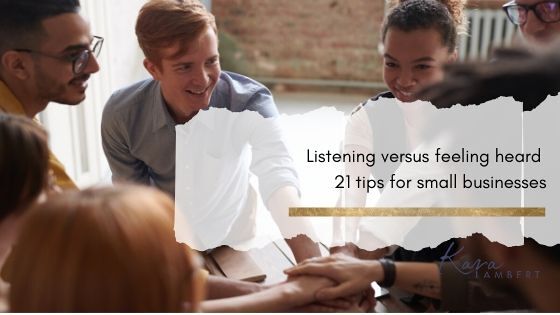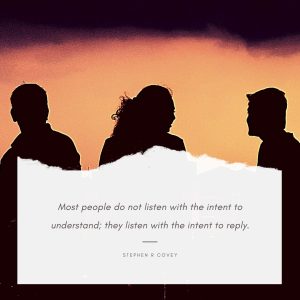Tom asked his staff member if they had understood the instructions, “yes” came the answer. Then some 30 minutes later Tom’s phone rang. It was his staff member, asking questions that Tom had answered and the staffer comfirmed hearing.
Lily walked into the shop and the shop assistant greeted her. Lily was very certain on what she needed, colour, size, and she told the shop assistant her needs. The shop assistant nodded knowingly and excused herself to get the product. Imagine Lily’s surprise when what was brought back was nothing like she described.
Most of us have been where Tom and Lily have been, some even in the place of the staff member or the shop assistant. So why don’t some people seem to listen and why do we need to feel heard?
Listening versus feeling heard facts
Listening is what the other person does and feeling heard is what we want and how we feel when we believe they’ve listened. Both rely on the perspective of the person doing the listening or wanting to be heard.
Listening
Most people listen for the information they believe is important. There are two critical points in this:
- What the person believes is important
- What is important to the person being listened to
TIP: What is important to one person may not be important to someone else.
 Feeling heard
Feeling heard
We like to feel heard because it validates us and what we’ve said, plus it validates the drivers behind what we said. Feeling heard depends upon:
- How the other person reacted as a listener
- The stories we tell ourselves about being heard in the past
- Our own drivers around what we said and feeling heard.
How to be a better listener
There are a few ways we can listen to others. The most important thing to remember is that it’s all about what the speaker wants you to know and what is driving what they have to say.
- As an active listener, when you’re also responding, it’s key to know the core of the issue or the end goal and work towards it.
- As a reflective listener, when you repeat the key points the speaker has made, it’s key to perspective take, show empathy when relevant, summarise from their drivers and ask for clarification and confirmation.
- As a discriminative listener, when you also pay attention to the emotions and other non-verbal cues, it’s important to not interpret or respond based on your drivers or the story you tell yourself when faced with similar circumstances.
- As an evaluative listener, someone who needs to listen, answer & make a judgement on what is said, it’s important to respond factually and not from a place of your drivers or story.
TIP: A good listener knows that the most important person is the speaker.
How to make sure you’re heard
It might seem silly but you really need to tell the listener that you need them to respond (or not) and if what you’re saying, and their response, is important to you. Yes, to be heard, it can mean being vulnerable and detailing what your drivers are and it can even take time to be clear on them yourself.
- To be heard you need to let the listener know that feeling heard is important.
- If you want a suggested solution, let them know.
- If you just want to be listened to and heard, let them know.
- If you feel misunderstood it’s ok to ask the listener to summarise what you said.
- Let the listener know if you feel afraid or anxious about the topic discussed.
- Remember that the listener is going to respond from their drivers, stories, and experiences and they may not be the same as yours (and that’s ok).
What to do when you’re not heard
So what about Tom and Lily? What do you do when you’re in their shoes and you haven’t been heard (or even listened to)?

Most bosses are likely to yell, especially if it’s a common occurrence, and most shoppers would smile sweetly and either try what was suggested or walk out.
TIP: It’s rarely personal
In these situations you need to be clear on the following:
- What boundaries do you need to maintain? Can you safely do it?
- Would escalating the issue resolve the situation? (or would it just make you feel better)
- What was your core driver? Were you wanting a fear understood, a need met, a belief or value validate, or a goal achieved?
- Can you understand why you were misunderstood or feel unheard?
- What story are you telling yourself about the situation?
- What can be learnt or done differently next time?
It can be hard being objective, especially when you feel unheard, unappreciated, misunderstood or not valued. When we understand that everyone comes to every situation with their own stories and drivers, we can use that knowledge to increase our chances of being heard and feeling valued. It also makes us a better listener. If you need help with this, I’m all ears.
Have you ever used your understanding of human drivers to help you in a situation where you needed to feel heard or you needed to make someone feel heard? I’d love it if you left me a comment below and told me the story.


 Feeling heard
Feeling heard